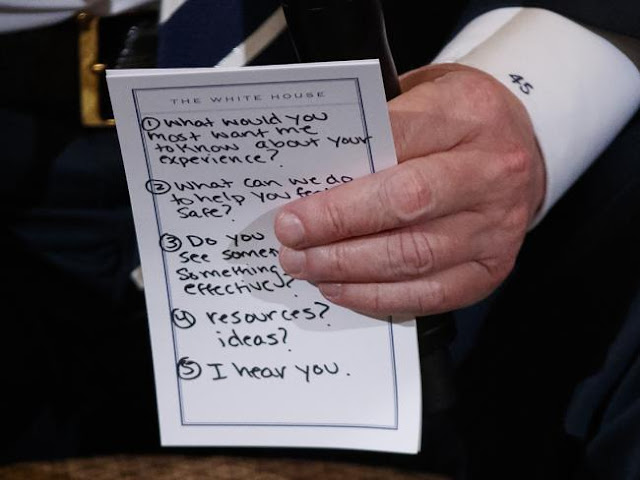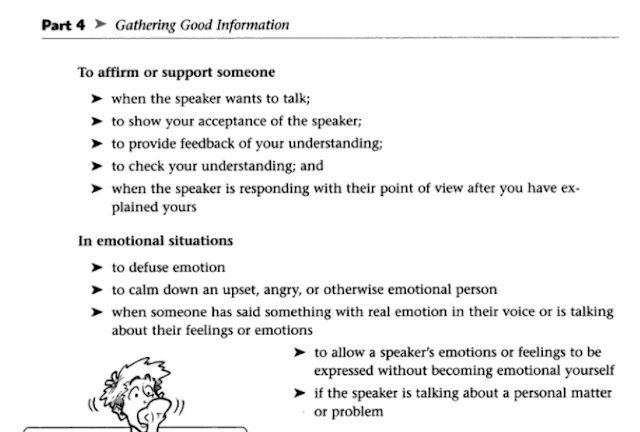What did Donald Trump do today?
He wished Rob Porter well, said it was "very sad" that he was leaving, and repeatedly emphasized Porter's claims that his ex-wives were lying.
Rob Porter was, until today, Trump's staff secretary, a position that required him to personally handle the classified paperwork that goes across Trump's desk. He had been denied a security clearance by the FBI, and while the
Trump White House seems to have known for months the reason for that denial, it only became public this week that Porter had been accused by both of his ex-wives of physical abuse.
Much of the
initial furor settled on
chief of staff John Kelly, who issued a full-throated defense of Porter even after pictures emerged showing Colbie Holderness, Porter's first ex-wife,
with a black eye. Asked for comment today, however, Trump weighed in, interrupting White House staffers who were trying to hurry him out of the room before responding.
REPORTER: Do you have a comment on Mr. Porter?
WHITE HOUSE AIDE: Thanks, everyone.
WHITE HOUSE AIDE: Thanks, guys.
TRUMP: Well, we wish him well. He worked very hard. I found out about it recently and I was surprised by it. But we certainly wish him well. It's obviously a tough time for him. He did a very good job when he was in the White House, and we hope he has a wonderful career, and hopefully he will have a great career ahead of him. But it was very sad when we heard about it, and certainly he's also very sad. Now, he also. as you probably know, he says he's innocent, and I think you have to remember that. He said very strongly yesterday that he's innocent, so you'll have to talk to him about that. But we absolutely wish him well. Did a very good job while he was at the White House. Thank you very much, everybody.
Trump has a long history of publicly siding with men accused of abusing women, and suggesting that women who come forward to report abuse are liars. A partial list includes:
Roy Moore. After
eight women came forward to accuse Alabama Senate candidate Roy Moore of sexually touching them when they were teenagers
as young as 14 and he was in his thirties, Trump bucked the general trend of Republicans recoiling in horror, and
stressed Moore's claims of innocence.
He denies it. Look, he denies it. If you look at what is really going on, if you look at all the things that have happened over the last 48 hours, he totally denies it. He says it didn't happen, and you know, you have to listen to him also. You're talking about, he says 40 years ago, this didn't happen, so, you know. ...Roy Moore denies it, that's all I can say, and by the way, he totally denies it.
Mike Tyson. When boxer Mike Tyson was convicted in 1992 of rape, Trump--who stood to lose a fortune in revenue if Tyson couldn't fight at his casinos--said, "It's my opinion that to a large extent Mike Tyson was railroaded in this case." Appearing on
The Charlie Rose Show, Trump
doubted the victim's testimony because she was able to compete in a pageant the next day. "I heard about a girl that, late in the evening, knocked on his door, was taken in, was raped--perhaps, perhaps not. Number one, she knocks late in the night. Number two, she's dancing in a beauty contest at 8:00 a.m. [the next day]. I saw the tapes. I see the big smile on her face. She's dancing happily at 8:00 a.m."
Roger Ailes. When the Fox News CEO was
engulfed in accusations by half a dozen female employees of sexual harassment and assault--charges that ultimately cost his network at least $45 million dollars in settlements--Trump came to his defense and said that the women were lying. He told the Washington Examiner, "I think they are unfounded just based on what I've read. Totally unfounded, based on what I read." He later
said this on
Meet the Press:
I can tell you that some of the women that are complaining, I know how much he's helped them, and even recently. And when they write books that are fairly recently released, and they say wonderful things about him. And now, all of a sudden, they're saying these horrible things about him. It's very sad because he's a very good person. I've always found him to be just a very, very good person. And, by the way, a very, very talented person. Look what he's done. So I feel very badly.
Bill O'Reilly. Trump also came to the defense of Bill O'Reilly, who was forced to resign from the network after the
New York Times discovered that he and Fox had
paid $13 million in settlements to women who accused him of harassing them, and retaliating against them professionally if they resisted his advances. Trump said in an interview that O'Reilly was "a person I know well – he is a good person. I think he shouldn’t have settled; personally I think he shouldn’t have settled. Because you should have taken it all the way. I don’t think Bill did anything wrong.”
Corey Lewandowski. While Trump's first campaign manager has largely escaped implication in the Russia conspiracy (unlike his successors, Paul Manafort and Steve Bannon) he was charged during the campaign with misdemeanor battery when he grabbed Michelle Fields, a Breitbart reporter, by the arm. Trump made his
defense of Lewandowski part of his stump speech, openly floating the idea that the reporter was lying about her injury: "How do you know those bruises weren’t there before?" He told a rally crowd that "it’s a very very sad day in this country when a man could be destroyed over something like that," and said that he couldn't fire Lewandowski because he had "a beautiful wife and children."
Himself. Trump has been
accused of sexual assault or harassment by about twenty women, not counting his own ex-wife's testimony that he raped her, or the many pageant contestants who corroborated his own story that he would use his position as the owner of beauty pageants to peep on them while they changed clothes.
Trump has
repeatedly said that every single woman who has accused him of misconduct is a liar.
Why is this a problem?
- It's bad if the President of the United States can't seem to believe women reporting abuse under any circumstances.



